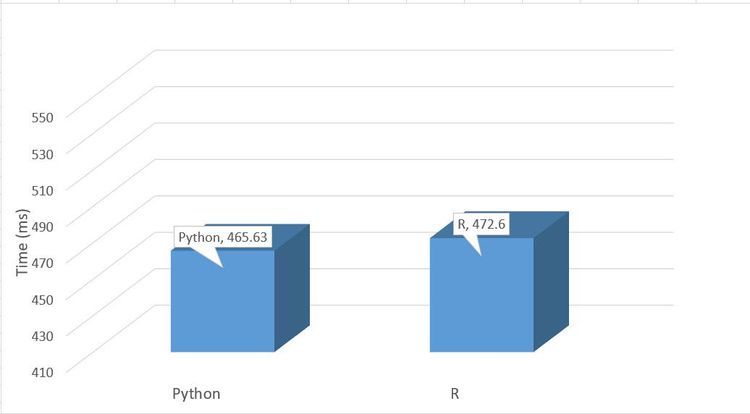Are you stuck between choosing Python or R for your first web scraping project? We're here to help.
In this article, we'll explain the main differences between the two languages and pick the winner across ten crucial web scraping verticals.
Read on!
Web Scraping with R or Python: Which One Should You Use?
R and Python are open-source programming languages that are well-suited for web scraping. However, R has fewer use cases and focuses on data analysis and visualization. Python is much more versatile. Its applications include machine learning, web, game, and GUI development, among many others.
While Python also has tools like Pandas and NumPy for data analysis, R offers more rich and customizable statistical libraries such as ggplot2, tidyr, Shiny, and dplyr.
In short:
If you're a beginner, choose Python for web scraping. It is more readable, enjoys excellent community support, and has a simple learning curve.
Consider R for web scraping if your project involves more statistical analysis than web scraping. R is less beginner-friendly than Python, and its community isn't as robust.
Take a look at the table below for a quick comparison of R and Python for the web scraping use case:
| R | Python | |
|---|---|---|
| Popularity | Low | High |
| Community support | Worse | Good |
| Documentation | Good | Good |
| Ease of use | Less beginner friendly | Beginner-friendly |
| Data analytics capability | Structurally built for data analysis (more robust and customizable tools) | Limited |
| Web scraping libraries | Fewer web scraping libraries available ('rvest') | Many scraping libraries to choose from Scrapy, BeautifulSoup, 'lxml', urllib |
| Scalability | Limited | Highly scalable |
| Versatility | More focused use cases | General-purpose language with many use cases |
| Integration landscape | Few integrations | Many integrations with third-party tools |
| Dynamic content handling | Supports RSelenium for headless browsing support | Supports automation tools like Selenium, Playwright, Pyppeteer, and Scrapy + Splash |
Now, let's take a look at the factors above in more detail.
Python Is Easier to Use for Web Scraping
Python's object-oriented nature lets you execute complex tasks with a few lines of code, and its syntax resembles writing in plain English. This simplicity reduces development time significantly, making it an excellent choice for web scraping.
R's syntax is less intuitive and beginner-friendly. Package management and installation in R can also pose a technical challenge, unlike Python's simplified library ecosystem.
R Wins in Post-scraping Data Analysis
Built-in analytics tools and dedicated libraries (ggplot2, dplyr, tidyr, tseries, or ggmap) make R more convenient for post-scraping tasks, such as data cleaning.
Python’s analytics libraries landscape is much smaller. It relies more on third-party solutions, which might require extra effort to learn and set up.
Even though R beats Python in data analysis, Python is still a better choice if you'd like to add extra features, such as database integration or API capabilities, to your scraper.
Python Has More Web Scraping Libraries
The variety of web scraping libraries for collecting data from static and dynamic pages makes Python more useful for large-scale continuous data extraction. For example, full-featured tools like Scrapy simplifies data extraction in Python.
R only supports a few web scraping libraries, which further complicates its workflow and makes scaling more difficult in complex scenarios.
Python Leads in Community Support
Python's community is large, surpassing R's active user base. The 2023 Stack Overflow Developer Survey ranks Python as the third most-used programming language, chosen by 49.28% of the responders. In comparison, R was picked by a mere 4.23%.
The rich library of content and the helpful community will let you quickly sort out web scraping-related Python problems. R is less popular for web scraping, leaving you with limited resources and solutions.
Python Is Faster than R
For a fair speed comparison, we performed a 100-iteration benchmark on Python's data extraction speed using BeautifulSoup and R with the 'rvest' package.
It took Python an average of 465.63 milliseconds to scrape the target website, while R extracted the same page under an average time of 472.60 milliseconds.
See the performance benchmark in the graph below:

The time unit used is millisecond. 1 second (s) = 1000 milliseconds (ms).
The tests show Python fares better in speed by a tiny margin.
Keep in mind that speed isn’t the only factor influencing efficiency. Final performance also relies on differences in tooling, operating systems, and scraping task complexity. Still, Python’s support for many helpers, including the Cython and threading modules, puts it further ahead of R.
Python Features More Options for Dynamic Content Handling
Python's robust web scraping ecosystem makes dynamic content extraction easier. A good example is Scrapy, a popular full-featured Python framework that integrates with tools like Splash for scraping dynamic content.
Headless browsers like Selenium, Playwright, and Puppeteer can also simulate real user interactions while scraping with Python.
Although R has tools like RSelenium and RCrawler, they offer fewer resources in terms of documentation and community adoption. So, their implementation can be technically challenging, especially for beginners.
Conclusion
In this article, you've learned the key differences between the web scraping capabilities of Python and R.
While R has fewer applications and is more focused on data analysis, Python is more versatile, beginner-friendly, and suited to large-scale web scraping.
Considering Python's flexibility and scalability, we highly recommend you choose Python, especially if you're only just starting your web scraping journey.
Ready to scrape? Check out our step-by-step guide to web scraping with Python.
And to bypass any detection system, try ZenRows, an all-in-one web scraping solution that integrates perfectly with any programming language.
Good luck!
Did you find the content helpful? Spread the word and share it on Twitter, or LinkedIn.